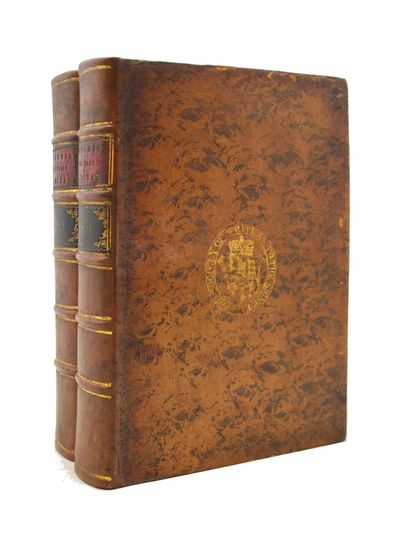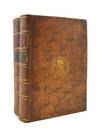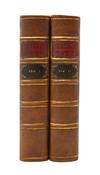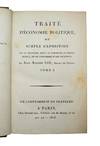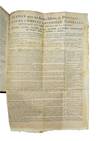first edition
1803 · Paris
by SAY, Jean-Baptiste
Paris: De l'Imprimerie de Crapelet, 1803. Full Description:
SAY, Jean-Baptiste. Traité d’économie politique, ou Simple exposition de la manière dont se forment, se distribuent, et se consomment les richesses. Paris: Chez Deterville, 1803.
First edition. Two octavo volumes (7 5/8 x 4 7/8 inches; 195 x 125 mm). [3], [1, blank], xlvi, 527, [1, blank]; [3], [1, blank], 572 pp. Complete with half-titles. Bound with publisher's folded advertisement leaf at the end of volume II. Bound without cancel leaf C8 in volume I as always.
Full contemporary mottled calf, rebacked to style. Two morocco lettering labels, lettered in gilt. Front and back board of each volume stamped in gilt with the armorial crest of "The Society of Writers to the Signet." Top edges dyed brown, others speckled red. Some spotting and toning, mainly in volume I. Previous owner's old ink signature on front free endpaper of volume I and along blank inner margin of first page on text in both volumes. An old shelf label, tipped in on front pastedowns. Overall a very good copy.
“Although Jean-Baptiste Say is remembered primarily for Say’s Law [“the apparently simple proposition that supply creates its own demand”], one of the cornerstones of classical economics, he was also an early proponent of the utility theory of value, and was therefore very much at odds with his classical contemporaries, to whom labour was the source of value. Say’s best-known work, his Traité d’économie politique (published in five editions, from 1803 to 1826) was intended as a shorter and more systematic presentation of economics than Adam Smith’s Wealth of Nations. The success of this book made Say the best-known expositor of Smith in Europe and America, and he became in 1815 France’s first professor of political economy” (New Palgrave).
“The central meaning of Say’s Law was implied by J.B. Say’s rhetorical question,‘how could it be possible that there should now be bought and sold in France five or six times as many commodities as in the miserable reign of Charles VI?’ This dramatized his main point, that there was no long-run limit to the growth of output, or of the demand for it...The first edition of Say’s Traité d’économie politique in 1803 contained the crucial propositions of Say’s Law” (New Palgrave).
The first edition was suppressed by Napoleon, and Say did not attempt a new one until 1814.
The Society of Writers to the Signet is a private society of Scottish Lawyers which dates back to 1594. According to their website "The Society owns and operates the Signet Library, a magnificent example of neo-classical architecture from the Enlightenment era, located in the heart of Edinburgh’s Old Town. The Signet Library is adjacent to St Giles’ Cathedral and connected to Parliament Hall where Scotland’s Supreme Courts are located. The Signet Library is not only a law library but a repository of books, manuscripts, newspapers, journals and other texts on all aspects of human knowledge and literature. Our archives are a treasure chest of Scottish history and culture."
Einaudi 5118. Goldsmiths' 18616. Kress B.4729.
HBS 69390.
$9,500. (Inventory #: 69390)
SAY, Jean-Baptiste. Traité d’économie politique, ou Simple exposition de la manière dont se forment, se distribuent, et se consomment les richesses. Paris: Chez Deterville, 1803.
First edition. Two octavo volumes (7 5/8 x 4 7/8 inches; 195 x 125 mm). [3], [1, blank], xlvi, 527, [1, blank]; [3], [1, blank], 572 pp. Complete with half-titles. Bound with publisher's folded advertisement leaf at the end of volume II. Bound without cancel leaf C8 in volume I as always.
Full contemporary mottled calf, rebacked to style. Two morocco lettering labels, lettered in gilt. Front and back board of each volume stamped in gilt with the armorial crest of "The Society of Writers to the Signet." Top edges dyed brown, others speckled red. Some spotting and toning, mainly in volume I. Previous owner's old ink signature on front free endpaper of volume I and along blank inner margin of first page on text in both volumes. An old shelf label, tipped in on front pastedowns. Overall a very good copy.
“Although Jean-Baptiste Say is remembered primarily for Say’s Law [“the apparently simple proposition that supply creates its own demand”], one of the cornerstones of classical economics, he was also an early proponent of the utility theory of value, and was therefore very much at odds with his classical contemporaries, to whom labour was the source of value. Say’s best-known work, his Traité d’économie politique (published in five editions, from 1803 to 1826) was intended as a shorter and more systematic presentation of economics than Adam Smith’s Wealth of Nations. The success of this book made Say the best-known expositor of Smith in Europe and America, and he became in 1815 France’s first professor of political economy” (New Palgrave).
“The central meaning of Say’s Law was implied by J.B. Say’s rhetorical question,‘how could it be possible that there should now be bought and sold in France five or six times as many commodities as in the miserable reign of Charles VI?’ This dramatized his main point, that there was no long-run limit to the growth of output, or of the demand for it...The first edition of Say’s Traité d’économie politique in 1803 contained the crucial propositions of Say’s Law” (New Palgrave).
The first edition was suppressed by Napoleon, and Say did not attempt a new one until 1814.
The Society of Writers to the Signet is a private society of Scottish Lawyers which dates back to 1594. According to their website "The Society owns and operates the Signet Library, a magnificent example of neo-classical architecture from the Enlightenment era, located in the heart of Edinburgh’s Old Town. The Signet Library is adjacent to St Giles’ Cathedral and connected to Parliament Hall where Scotland’s Supreme Courts are located. The Signet Library is not only a law library but a repository of books, manuscripts, newspapers, journals and other texts on all aspects of human knowledge and literature. Our archives are a treasure chest of Scottish history and culture."
Einaudi 5118. Goldsmiths' 18616. Kress B.4729.
HBS 69390.
$9,500. (Inventory #: 69390)
